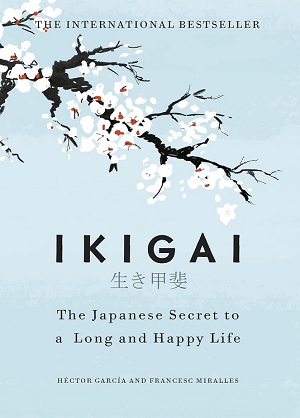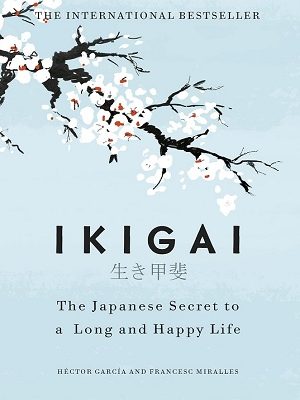Ikigai: The Japanese Secret to a Long and Happy Life by Francesc Miralles and Héctor García explores the Japanese concept of “ikigai,” which can be understood as the reason for being or the purpose that gives life meaning. This book delves into how the people of Okinawa, particularly the centenarians of the village of Ogimi, embody this concept and live long, fulfilling lives. Below are 20 key lessons from the book:

Read: The 5 AM Club
1. Understanding Ikigai: The Core of a Fulfilling Life
Key Insight: Ikigai is a Japanese concept that combines the words “iki” (life) and “gai” (worth). It represents the intersection of what you love, what you are good at, what the world needs, and what you can be paid for. Finding your ikigai leads to a more meaningful and joyful life.
Actionable Tip: Reflect on these four areas in your life: passion, mission, vocation, and profession. Consider how they intersect and how you can align them to discover your ikigai.
2. The Power of Purpose
Key Insight: Having a strong sense of purpose, or ikigai, is linked to longevity and happiness. The book highlights that knowing why you wake up each morning can significantly impact your overall well-being and life satisfaction.
Actionable Tip: Write down your reasons for waking up each day. Identify what drives you and brings you joy. Use this as a guide to shape your daily activities and long-term goals.
3. Embracing the Present Moment
Key Insight: Living in the present moment is a key aspect of the ikigai philosophy. The book emphasizes that focusing on the here and now, rather than dwelling on the past or worrying about the future, leads to a more peaceful and fulfilling life.
Actionable Tip: Practice mindfulness by engaging fully in your current activities. Whether it’s eating, working, or spending time with loved ones, be present and appreciate the moment.
4. The Importance of Community
Key Insight: Strong social connections and a sense of community are crucial for a long and happy life. The people of Ogimi have close-knit relationships, which contribute to their sense of belonging and well-being.
Actionable Tip: Invest time in building and maintaining relationships with family, friends, and neighbors. Participate in community activities and support networks that foster a sense of connection.
5. Staying Active and Moving Naturally
Key Insight: Regular physical activity is a cornerstone of longevity. The book notes that the people of Okinawa do not engage in strenuous exercise routines, but they stay active through natural movement, such as gardening, walking, and household tasks.
Actionable Tip: Incorporate natural movement into your daily routine. Walk instead of driving short distances, take the stairs, or engage in hobbies that require physical activity, like gardening or dancing.
6. Eating Light and Balanced
Key Insight: The Okinawan diet is rich in vegetables, fruits, and fish, and low in processed foods and sugar. The concept of “hara hachi bu,” or eating until you are 80% full, is practiced to avoid overeating.
Actionable Tip: Adopt a balanced diet rich in plant-based foods and fish. Practice portion control by eating slowly and stopping when you feel about 80% full, rather than when you are completely satisfied.
7. Cultivating Resilience and Adaptability
Key Insight: Resilience is a key trait of those who live long lives. The book highlights how the elderly in Okinawa have faced challenges with grace and adaptability, viewing them as opportunities for growth.
Actionable Tip: Develop resilience by practicing gratitude, staying optimistic, and learning from difficulties. Embrace change as a natural part of life and use it as a chance to grow stronger.
8. The Role of a Positive Mindset
Key Insight: A positive mindset contributes significantly to longevity and happiness. The book suggests that maintaining a cheerful disposition, finding joy in small things, and avoiding stress are crucial for a long, happy life.
Actionable Tip: Cultivate a positive mindset by focusing on the good in your life, practicing gratitude daily, and engaging in activities that make you happy. Reduce stress through relaxation techniques such as deep breathing, meditation, or spending time in nature.
9. The Value of Lifelong Learning
Key Insight: Lifelong learning keeps the mind sharp and engaged. The elders of Okinawa continue to learn new things, stay curious, and pursue their passions, which contributes to their mental and emotional well-being.
Actionable Tip: Keep your mind active by learning new skills, reading, and staying curious. Engage in activities that challenge your intellect and stimulate your creativity.
10. Finding Flow in Daily Activities
Key Insight: The concept of “flow,” or being completely absorbed in an activity, is essential to ikigai. When you are in a state of flow, time seems to disappear, and you experience deep satisfaction and fulfillment.
Actionable Tip: Identify activities that put you in a state of flow—whether it’s work, a hobby, or a physical activity. Dedicate regular time to these activities and allow yourself to be fully immersed in them.
11. The Importance of Simplicity
Key Insight: Living simply, with fewer material possessions and a focus on what truly matters, is a common trait among the Okinawan elders. This simplicity contributes to their stress-free and content lives.
Actionable Tip: Simplify your life by decluttering your living space, reducing unnecessary purchases, and focusing on experiences rather than material things. Prioritize quality over quantity in all aspects of your life.
12. Practicing Gratitude Daily
Key Insight: Gratitude is a fundamental aspect of the Okinawan lifestyle. Regularly expressing thanks for what you have contributes to a positive outlook and overall happiness.
Actionable Tip: Start a daily gratitude journal where you list things you are thankful for each day. Reflect on these regularly to cultivate a mindset of appreciation and contentment.
13. Nurturing Spirituality
Key Insight: Spirituality, whether through religion, meditation, or a connection to nature, plays a vital role in the well-being of Okinawan elders. It provides them with a sense of peace, purpose, and connection to something greater than themselves.
Actionable Tip: Explore your spiritual side by engaging in practices that resonate with you, such as meditation, prayer, or spending time in nature. Connect with your inner self and seek meaning beyond the material world.
14. Purpose-Driven Work and Hobbies
Key Insight: Engaging in meaningful work and hobbies is a key element of ikigai. The elders of Okinawa remain active in their communities, often continuing to work or pursue their passions well into old age.
Actionable Tip: Identify work or hobbies that give you a sense of purpose. Whether it’s through your job, volunteering, or creative pursuits, find activities that align with your values and bring you fulfillment.
15. Living with a Sense of Purpose
Key Insight: Living with a clear sense of purpose gives direction and meaning to life. The book emphasizes that having a reason to get up in the morning contributes to both mental and physical health.
Actionable Tip: Define your life’s purpose by reflecting on what truly matters to you. Set long-term goals that align with this purpose and take daily actions that move you closer to fulfilling it.
16. The Role of Tradition and Culture
Key Insight: Tradition and cultural practices play a significant role in the lives of Okinawan elders. These practices, whether through rituals, festivals, or daily routines, help maintain a sense of identity and continuity.
Actionable Tip: Embrace and celebrate your cultural traditions and heritage. Participate in rituals and practices that connect you to your roots and provide a sense of belonging and continuity.
17. Staying Connected with Nature
Key Insight: A close relationship with nature is integral to the Okinawan way of life. The natural environment provides not only physical health benefits but also mental and spiritual nourishment.
Actionable Tip: Spend regular time outdoors, whether it’s walking in the park, gardening, or simply enjoying the fresh air. Allow nature to rejuvenate your body and mind, and appreciate its beauty and tranquility.
18. Maintaining a Balanced Life
Key Insight: Balance in all aspects of life—work, relationships, diet, and leisure—is key to long-term happiness and health. The Okinawan way of life emphasizes moderation and harmony.
Actionable Tip: Strive for balance in your daily life by managing your time effectively, prioritizing self-care, and ensuring that all areas of your life are given appropriate attention.
19. The Joy of Small Things
Key Insight: Finding joy in small, everyday moments is a cornerstone of the Okinawan approach to life. Whether it’s a cup of tea, a conversation with a friend, or a walk in the garden, these moments are cherished and savored.
Actionable Tip: Practice mindfulness by paying attention to and appreciating the small moments in your day. Cultivate a sense of joy in the simple pleasures of life.
20. Building a Supportive Environment
Key Insight: The environment in which you live, work, and socialize greatly influences your well-being. The book emphasizes the importance of surrounding yourself with positivity, whether through people, spaces, or habits.
Actionable Tip: Create a positive environment by decluttering your space, surrounding yourself with supportive people, and engaging in activities that uplift and inspire you
Conclusion
By applying these lessons from Ikigai: The Japanese Secret to a Long and Happy Life, you can cultivate a life of purpose, joy, and longevity. The wisdom of the Okinawan elders, as shared by Francesc Miralles and Héctor García, offers timeless guidance on how to live a fulfilling life by embracing simplicity, staying active, and finding your ikigai. Whether you are seeking greater meaning in your daily life or striving for long-term happiness and health, these lessons provide a roadmap to a life well-lived (Amazon).



